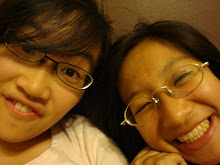Like a race track, a movie theater, or the lottery, a sushi bar is a place of possibility. The unpredictability of the sushi conveyor belt, the impossibility of knowing what will pass your seat next, seem to promise even the most unlikely. At any moment, you could aim for a dish of sashimi but grab a pair of arctic clam sushis by mistake, and find that you like them much more. A particularly flustered waiter could bring you a hand roll you never ordered and end up catching your fancy.You could discover that the mayonnaise-laced prawns look quite revolting up close and be caught in the act of sneaking them back onto the conveyor belt. While ordering you could be told that the restaurant had run out of salmon, only to watch several plates of it parade past your table just as you are about to leave.
In truth, there was much we did not forsee that Friday, even before we began ordering sushis and sashimi. I did not expect to find Ann wearing mismatched slippers as she proudly showed me her spotless living room. Karen did not expect to walk up several flights of stairs before realizing that she could not find the right door because she was in the wrong building. And who would have thought that as several batches of cranberry oatmeal cookies shriveled in the oven, we would be too distracted by Scrabble troubles to notice?
When spending time with family and friends, you often come to expect the ordinary. Because these are the people you love most, they are also the people you often find most predictable. Daddy will always do something absentminded, like wear a bib out of the dentist's office or try to force his way into a restaurant that has already closed. Mommy and Emily will never agree on which clothes are fit to wear, but will always manage to reach some sort of compromise. Ann, Karen, and Christine will never mention rabbits without adding some sort of derogatory comment involving "unwashed" and "disgusting."
The patterns you observe become, in your mind, established facts, and you become grow certain that things could never happen any other way. You learn to anticipate their reactions and take precautions. (ex: Baby Rabbit should mentioned minimally in conversation.) And yet, somehow, even when all patterns have seemingly been noted and mapped out, the unexpected happens. Mommy and Emily actually decide on a dress for Emily's junior prom together. Daddy sits through a doctor's appointment with me without once asking me a question about personal hygiene or the last time I washed my hair. My friends overcome their phobia of rabbits and kidnap mine, only to return her to me, several hours of frantic questioning later, in a sealed sandwich bag.
One of the things that surprised me most this Friday was the discovery that there are people who care what I write in my blog. Who leave comments so I can experience the thrill of getting feedback. Who read my posts and remember enough to discuss them over miso soup and sushi, if only to debate whether my latest story is about a cockroach, or if watermelon really can be eaten from the bottom up.









